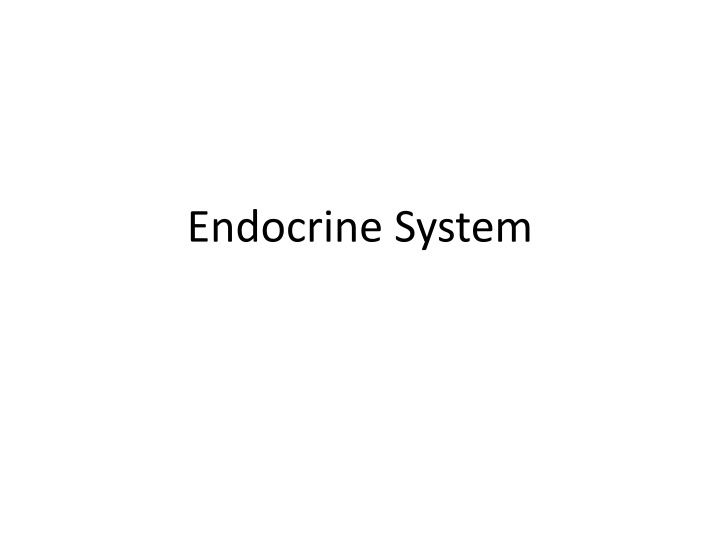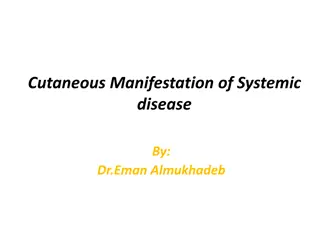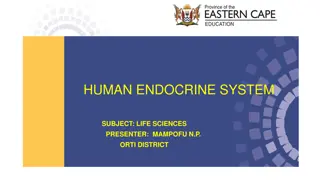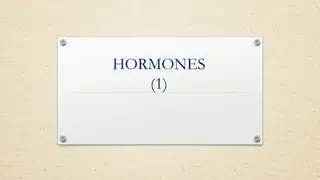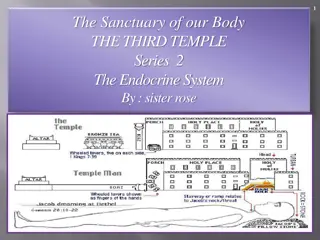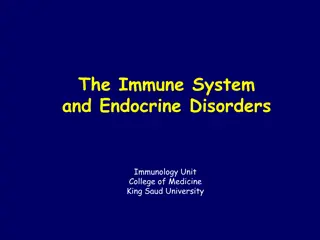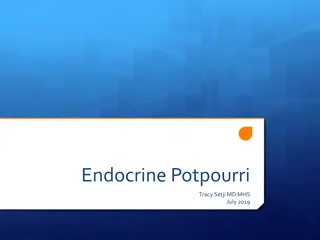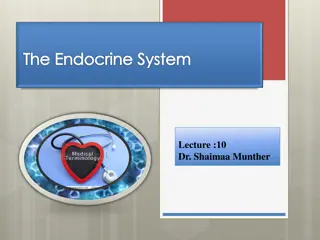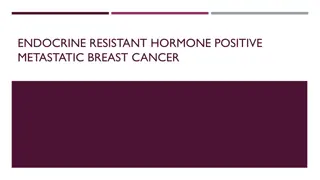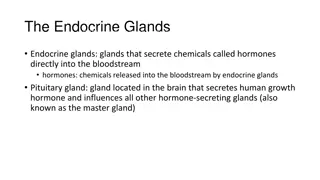The Endocrine System
The endocrine system consists of glands like the hypothalamus, pituitary, thyroid, parathyroid, adrenal, and others. Learn about the thyroid gland, its functions, and conditions like hyperthyroidism. Understand the role of hormones and their impact on the body.
Download Presentation

Please find below an Image/Link to download the presentation.
The content on the website is provided AS IS for your information and personal use only. It may not be sold, licensed, or shared on other websites without obtaining consent from the author.If you encounter any issues during the download, it is possible that the publisher has removed the file from their server.
You are allowed to download the files provided on this website for personal or commercial use, subject to the condition that they are used lawfully. All files are the property of their respective owners.
The content on the website is provided AS IS for your information and personal use only. It may not be sold, licensed, or shared on other websites without obtaining consent from the author.
E N D
Presentation Transcript
The Endocrine System Consists of several glands located in various parts of the body Specific Glands Hypothalamus Pituitary Thyroid Parathyroid Adrenal Kidneys Pancreatic Islets Ovaries Testes
Thyroid Gland The thyroid gland is located on the front part of the neck below the thyroid cartilage (Adam's apple). Gross section of normal thyroid gland
Thyroid gland function Thyroid gland produces thyroid hormones: Thyroxin (T4) ,and triiodothyronine(T3) are important in: growth development maintaining normal body temperature energy metabolism regulation Stimulate metabolism of all cells Calcitonin Decreases blood calcium concentration by inhibiting breakdown of bone *The thyroid gland uses from the diet in foods such as seafood, bread, and salt) to produce thyroid hormones
The hypothalamus releases a thyroid releasing hormone (TRH), which sends a signal to the pituitary to release thyroid stimulating hormone (TSH), (TSH, a pituitary hormone) modulates thyroid function by binding to TSH receptors (TSH-R) and sends a signal to the thyroid to release thyroid hormones. T4&T3
Hyperthyroidism case presentation A 37-year-old female presents to your clinic with a three week history of palpitations, feeling hot all the time, anxiety ,weigh loss, increased appetite and oligomenorrhea. On physical examination Patient has diffuse goiter (enlarged thyroid gland) Palpitation Tremor(involuntary movements and can affect the hands, arms, head, face, vocal cords, trunk, and legs) What do you think the patients primary problem is?
Hyperthyroidism Hyperthyroidism (overactive thyroid gland): thyroid gland produces and secretes excessive amounts of thyroid hormones, riiodothyronine (T3) and thyroxine (T4).
Hyperthyroidism Clinical Manifestations What signs might you find on exam? diffuse goiter (enlarged thyroid gland) weight loss (often accompanied by an increased appetite intolerance to heat tremor Rapid or irregular heartbeat (palpitations or arrhythmia) hyperactivity, restlessness and difficulty sleeping Frequent bowel movements sweating Nervousness weakness, fatigue menstrual irregularities in women or amenorrhea nausea, vomiting diarrhea
Hyperthyroidism What is the initial test you need it to confirmed the diagnosis? Diagnosis Blood tests to measure levels of TSH , total and free T3 and T4( TT3,FT3,TT4,FT4) Radioactive iodine uptake and scan CT scan or ultrasound FNA in thyroid cancer
Hyperthyroidism What Causes Hyperthyroidism? There is many causes Graves disease is the most common cause of hyperthyroidism and thyrotoxicosis
Hyperthyroidism The test results of the patient show TSH ,T4 ,T3 Confirmed that the patient has hyperthyroidism Is the patent has hyperthyroidism caused by Graves disease ?! what additional tests would you order?
Graves disease Graves' Disease is an autoimmune condition in which autoantibodies are directed against the thyroid-stimulating hormone (TSH) receptor . lead to stimulate the production of thyroid hormones, thyroxin (T4)and triiodothyronine(T3) the autoantibodies are not under a negative feedback control system overproduction of the thyroid hormones (hyper thyrpdisim) many metabolic problems. lead to
Graves disease Risk factors: is most common in women over age 20. White and Asian populations are at higher risk than black populations The disease is more common in female more than male family history of thyroid disease and Genetic factors Smoking is also a significant risk factor
Graves disease symptoms Patients with Graves' disease can exhibit a variety of symptoms related to hyperthyroidism some patients with Graves' disease exhibit unique symptoms including: (bulging eyes) pretibial myxedema (swelling of legs ) Graves' disease is often called diffuse toxic goiter because the entire thyroid gland is enlarged.
Graves disease Bulging eyes weight loss Tremor heart Palpitation pretibial myxedema
Thyroid goiter Thyroid goiter :is enlargement of thyroid gland can be present in hyperthyroidism disorders as well as in hypothyroidism disorders
Hyperthyroidism Graves disease patient with Graves disease show Bulging eyes
Graves disease Bulging eyes Thyroid goiter Patient with Graves disease show bulging eyes and diffuse goiter (enlarged thyroid gland)
Graves disease : pretibial myxedema
Graves disease Diffuse toxic goiter of Graves disease, gross, showing symmetric, non-nodular hypervascular enlargement of the thyroid
Graves disease Diagnosis Anti-TSH receptor antibody: (TRABs) are specific test for Graves disease
Hyperthyroidism Treatment : Antithyroid medications Radioactive iodine (which destroys the thyroid and stops the excess production of hormones) Surgery to remove the thyroid If the thyroid must be removed with surgery or destroyed with radiation, the patient must take thyroid hormone replacement pills for the rest of his life.
Hypothyroidism case study presentation A 46-year-old female presents with a 6-month history of fatigue, constipation, menorrhagia, cold intolerance , loss of pitied and weight gaining. She mentions incidentally that her mother has thyroid problems. What is the probably diagnosis? Hypothyroidism
Hypothyroidism What is hypothyroidism? hypothyroidism : is low production of thyroid hormone (T4),(T3). Myxedema :is hypothyroidism but in its extreme form
Hypothyroidism What are the symptoms of hypothyroidism? Clinical manifestation: Sleepiness constipation dry skin droopy eyelids puffy and swollen face slowing of the heart rate Enlarged neck or presence of goiter intolerance to cold weight gain Increased blood cholesterol Poor memory Nigh blindness Heavy and irregular periods
Buffy dull face with dray skin The patient with severe hypothyroidism (myxedema) has a dull, puffy facies. The edema, often particularly pronounced around the eyes, (periorbital edema )does not pit with pressure. The hair and eyebrows are dry, coarse, and thinned. The skin is dry.
Hypothyroidism two cases of hypothyroidism two cases of hypothyroidism, patient before (A and C) and after (B and D) after full replacement with thyroid hormone recovered from hypothyroidism. In fig A, Notice the loss of eyelashes, the areas of vitiligo around the mouth, the region around the eyes, and the scalp. In figure-C, Notice the lethargic expression and the periorbital puffiness disappears with therapy (D).
Hypothyroidism What causes hypothyroidism? Causes: Hashimoto s disease Thyroid destruction (from radioactive iodine or surgery , infections ) Pituitary or hypothalamic disease Medications Severe iodine deficiency
Hypothyroidism How is hypothyroidism diagnosed? Measuring blood levels of thyroid (T4,T3) hormones TSH blood concentration . The lab analysis show: blood levels of thyroid (T4,T3) decreased. TSH blood concentration increased ( high) the lab analysis confirmed the patient has hypothyroidism Is the patient has Hashimoto s disease ?!
Hashimotos disease What is the Hashimoto s disease? Hashimoto's (chronic thyroiditis is) an autoimmune disorder directed against thyroid antigens and is the most common cause of hypothyroidism. how can be confirmed if the patient has Hashimoto s disease? by thyroid peroxidase (anti-TPO antibodies) concentration . Hashimoto's can be identified by detecting anti- TPO antibodies in the blood
Hypothyroidism (Right) Struma lymphomatosa in Hashimoto thyroiditis, gross. Note: diffuse, pale yellow infiltrate affecting the entire thyroid. The yellow infiltrate is caused by an influx of lymphocytes, which may form follicles. Normal thyroid (Left)
Hypothyroidism How is hypothyroidism treated? receive thyroid hormone replacement therapy
Hashimoto disease Graves s disease During Hashimoto's thyroiditis, self-reactive CD4+ T lymphocytes recruit B cells and CD8+ T cells into the thyroid. Disease progression leads to the death of thyroid cells and hypothyroidism. Both autoantibodies and thyroid-specific cytotoxic T lymphocytes (CTLs) have been proposed to be responsible for autoimmune thyrocyte depletion. b | In Graves' disease, activated CD4+ T cells induce B cells to secrete thyroid-stimulating immunoglobulins (TSI) against the thyroid-stimulating hormone receptor (TSHR), resulting in unrestrained thyroid hormone production and hyperthyroidism
Case study A 51-year-old woman presented with weight loss (despite good appetite), palpitations, tremor, and heat intolerance. On examination, she had diffusely enlarged thyroid, periorbital edema, and proptosis, as well as mild thickening of the skin in the pretibial area.
Case study (1) The lab results of thyroid-function tests: (TSH) thyroid-stimulating hormone level : 0.1 mU /ml < (normal range, 0.5 to 5.15) (T3) triiodothyronine level: 557 ng/dl normal range, 100 to 190 ng /dl (T4 )thyroxine level 17.9 g /dl (normal range, 4.4 to 12.5 g/dl) Anti-TSH receptor antibodies (normal range (0.0 to 16.0 Unit: %) 69.6 % .
Case study (1) What is the diagnosis ? Hyperthyroidism What is the cause of hyperthyroidism, and why ? Graves disease because the patient has Anti-TSH receptor antibodies
